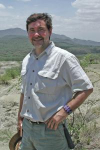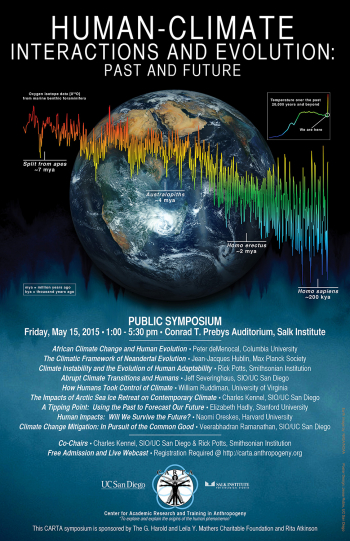Human-Climate Interactions and Evolution: Past and Future
Charles Kennel, Scripps Institution of Oceanography and University of Cambridge
Rick Potts, Smithsonian Institution
Summary: Our early ancestors evolved on a drying, cooling, and highly variable planet, which has led to competing ideas as to how climate may have shaped human evolution. Equally compelling is the question of how and when humans began to affect their surroundings to such an extent as to become a force of climate change, with disruptions affecting the globe today. According to earth scientists, paleontologists, and scholars in other fields, the planet has entered a new geological phase – the Anthropocene, the age of humans. How did this transition of our species from an apelike ancestor in Africa to the current planetary force occur? What are the prospects for the future of world climate, ecosystems, and our species? This symposium presents varied perspectives on these critical questions from earth scientists, ecologists, and paleoanthropologists.
Media for each talk can be played by clicking on icons in the table below, or by clicking on the individual talk titles below and then the attachment file at the bottom of the page.
| Speakers | Media | Session |
|---|---|---|
 Ajit Varki |
|
Welcome |
 Charles Kennel |
|
Opening Remarks |
 Peter deMenocal |
|
African Climate Change and Human Evolution Analytical advances, new sediment archives, and heroic international collaborations have advanced our understanding of the role that climate change may have played in shaping major junctures in early human evolution. Gone is the dated view of our ancestors emerging from some ancient dark forest to assert dominion over the grassy plains. In its place is new evidence from ocean and terrestrial sediment archives and faunal remains that document large orbital-scale climate cycles that shifted,... read more |
 Jean-Jacques Hublin |
|
The Climatic Framework of Neandertal Evolution Neandertals represent the best documented group of Middle to Late Pleistocene archaic hominins. They are best documented in western Europe but have also been present at some point in their evolution in the Levant, central Asia and some parts of southern Siberia. There is growing evidence that their evolutionary trajectory started much earlier in time than was previously thought. The paleontological record is quite scarce when considering the earliest peopling of Eurasia, and in general... read more |
 Rick Potts |
|
Climate Instability and the Evolution of Human Adaptability How environmental dynamics may have shaped the adaptations of early human ancestors is one of the profound questions in the study of human evolution. A synthesis of African paleoclimate data suggests that significant events in human origins tended to occur during lengthy eras of strong climate fluctuation. For example, the origin of several hominin genera, major stone technologies, and key dispersal events all corresponded with prolonged intervals of increased climate variability. Between 350,... read more |
 Jeff Severinghaus |
|
Abrupt Climate Transitions and Humans Rainfall patterns at low latitudes shifted abruptly northward 14,700 years ago, and again 11,700 years ago. From studies of ice cores and tree rings, it is clear that these transitions were extremely fast, on the order of a decade, with up to half of the change occurring in one year. Remarkable archaeological evidence from western Asia, including precise radiocarbon dating, suggests that major changes 1) away from nomadic lifestyles and 2) initiation of agriculture began within error at... read more |
 William Ruddiman |
|
How Humans Took Control of Climate Until the last decade, the consensus opinion had been that significant human effects on greenhouse gases and climate began during the Industrial Era (the last 200 years). But this paradigm is under assault based on evidence from several fields of research that suggests human intervention in the climate system thousands of years ago. Greenhouse-gas concentrations measured in bubbles of ancient air trapped in the Antarctic ice sheet show that carbon dioxide (CO2) and methane (CH4) concentrations... read more |
 Charles Kennel |
|
The Impacts of Arctic Sea Ice Retreat on Contemporary Climate The El Nino event of 1998 caused a transition from growth in global temperature to nearly zero growth. This “hiatus” in warming occurred even though greenhouse gas emissions accelerated after 1998; it is a major public argument against action on climate change. During the hiatus, the Arctic region warmed, and sea ice, land ice, and snow-cover retreated faster than before. The oceans began to bury the expected warming at depths inaccessible to the atmosphere. The extra warming created by sea... read more |
 Elizabeth Hadly |
|
A Tipping Point: Using the Past to Forecast Our Future Earth’s environments are rapidly changing. Yet, animals evolved in the face of environmental change. Extracting the responses of animals to perturbations of the past is one of the best ways of unraveling how they will respond to perturbations of the future. Large environmental events provide unique opportunities for insights into resilience of animals over time. The transition from the cold, arid Late Pleistocene (LP) glacial period to the warm, mesic Holocene interglacial witnessed the... read more |
 Naomi Oreskes |
|
Human Impacts: Will We Survive the Future? I was asked to speak to the question: Will we survive the future? The answer, of course, is yes. With the world population at 7 billion people, it is exceedingly unlikely that humans, as a species, will go extinct any time soon. Humans are highly adaptable. We have faced and survived serious challenges before, and most of us are likely to survive the challenges of the coming century as well. However, with atmospheric CO2 now exceeding 400 ppm, and global fossil fuel usage continuing to rise... read more |
 Veerabhadran Ramanathan |
|
Climate Change Mitigation: In Pursuit of the Common Good Climate Change has become a defining problem threatening the future well being of humanity and the ecosystems. We find ourselves in this precarious position largely because scientific knowledge has not yet lead to timely actions to mitigate the pollution. I will first provide the scientific foundation for the link between atmospheric pollution and climate change. I will then get into the thorny ethical issues such as how most of the pollution is due to unsustainable consumption by just one... read more |
 All Speakers  Rick Potts  Margaret Schoeninger |
|
Question & Answer Session and Closing Remarks |
| Attachment | Size |
|---|---|
| 1.41 MB | |
| 144.97 KB | |
| 201.34 KB | |
| 801.38 KB | |
| 209.63 KB |
If you enjoy this event, please consider supporting CARTA's quest to explore and explain the human phenomenon.


